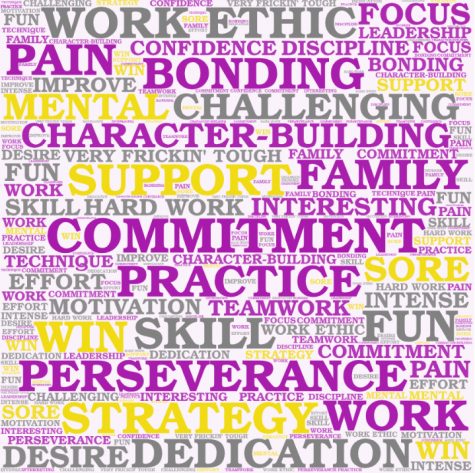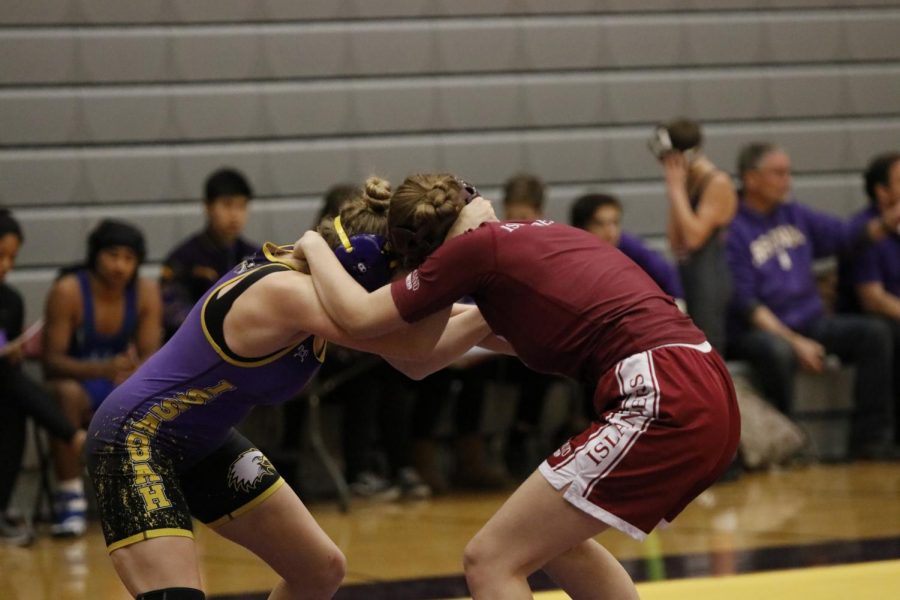An Inside Look at the Undefeated Issaquah Wrestling Team
January 28, 2020
Near the beginning of the wrestling season, my friend, sophomore Isabella Campbell, convinced me to attend a wrestling practice. Within the first five minutes, I became so inspired that I took out my notebook and started jotting down notes.
First, they all got together and unrolled the mats, each team member pulling their weight to get the task done. Already, I recognized their unity and order.
Next, they went out the gym door to do warm-ups on the stairs for twenty minutes. “We run up and down, we do squat jumps skipping one, then two, then three,” Campbell explained. “We do one-legged jumps and fast steps. Sometimes we’ll do bear climbs backwards. We keep going until there’s sweat dripping off the walls.” I mentioned that I thought I heard some sort of singing or chanting, and junior Mason Stewart laughed, nodding. “It gets so hot and sticky in there, so sometimes we’ll sing something that comes to mind while we’re doing it to get our spirits up.”
When they returned, most were dripping with sweat and red in the face. Instead of taking a break, they began to jog in single file around the mat. The coaches got on their knees in the path of the wrestlers and acted as obstacles. The wrestlers dived, army crawled, and rolled over and under their arms.
Next, they got into “7 Lines.” The first wrestler would do an exercise across the mat (sprints, bear crawls, crab walks, etc.), and the second wrestler would follow a few feet behind. Now, I’m in self-defense this semester and we do those kinds of exercises as well. But let me be clear, it is very different when the wrestling team does them. It was like crab walks on steroids – they literally tore across the room, then back. The crab walks were one thing, but when they began bear walks, my mouth truly dropped. All of them pounded across the mats, spinning in circles while on all fours. It looked like absolute chaos, and yet somehow, there was not one collision. The wrestlers partnered with someone in their line and took turns throwing the other over their shoulder and running laps around the mat or doing squats. They effectively used each other as weights. Going back to PE, whenever a class is doing exercises or warm-ups, there is always a good chunk of kids who slack off when the teacher is not looking. But, that did not seem to cross any of the wrestlers’ minds. It was constant movement, constant unity, constant focus. Even during water breaks they were still bouncing on their heels.
Then, the wrestlers got into partners and practiced moves, spending about one hour per move. The coaches intervened occasionally to critique or demonstrate. The wrestlers also helped each other, correcting mistakes while encouraging each other to keep trying. Cory Kawaguchi, a senior on the varsity team said, “One of my responsibilities as a captain is to help the other wrestlers improve on their skills and make sure everyone is focused.”

After witnessing that rigorous conditioning and the dedication in each of the wrestlers, I was beginning to understand why the Issaquah team has been undefeated for four years. Coach Hyatt, who has been coaching for twenty-five years and won the title of KingCo Champ for Issaquah in 1974, said, “My strategy to succeed this season will stay the same as the past years: keep them moving, always, and capitalize on any mistakes so we can fix them and improve.”
What I still did not understand was the appeal of putting oneself through such physical torture and mental exhaustion every year. I am no athlete, so I cannot relate to having that kind of discipline and dedication. In order to better understand the perspective of the wrestlers, I sat down with a few of them.
Kawaguchi has been wrestling throughout his middle school and high school career. He said, “I joined wrestling in middle school because my dad wrestled, so I thought I would give it a try. My goal for this season is to go to state. In the week prior to a match, I work on my skills. I’m consistently putting my body on the line. It’s a very physical sport. Over the years, I think wrestling has given me better leadership skills and work ethic.”
Junior Victor “Cradles” Marcenac gave me insight on just how dedicated he is. He told me, “Recently I was diagnosed with diabetes, so I have to monitor that. I’d like to do a better job of managing that this season because I could pass out during a match if I’m low on glucose.” It stuck with me that he did not consider this condition as an end to his wrestling career, but as a challenge to overcome. Sure enough, he said, “Wrestling has taught me how to deal with challenges better. I’ve learned discipline. I’ve matured, and I’m a better leader. There’s a lot of team spirit and bonding.”
Stewart said, “I didn’t wrestle in middle school because I didn’t think I was ready for that kind of commitment, but in high school, my friend convinced me to join wrestling. Since then, I’ve gotten tougher in all aspects of my life. I think I’m just a better person overall.” I asked him about the commitment he mentioned, and he explained, “It’s hard work. Training is a daily commitment, and sometimes you get really sore, like, so bad that you can’t even walk up the stairs. And sometimes you think you can’t do it, that it’s too hard, that, you know, maybe you could just sit out for today. But you have to push through. You can’t quit, and the team won’t let you quit. We all build off each other and support each other.”
Sophomore Jacob Law agreed, and said, “I like to push myself physically, and it’s a great way to stay in shape. In middle school, I was focused more on me individually, but in high school I’ve really connected with the team, so it’s a lot more fun. In high school there’s a lot more conditioning than in middle school, so my first few practices in high school were so hard. But I’ve gotten used to it.”
I was also curious about the difference in experiences between girl and boy wrestlers. I asked sophomore Greta Cavotta if she ever feels at a disadvantage because of her gender. She said, “Yes, because my experience is just different. For example, I have to think about different strategies to wrestle. It’s stressful to pick partners in practice because I feel like I’ll be dragging them down, like I’m a burden. We do the same training, but Bella and I have to try a lot harder. I constantly feel like I’m going to be in JV forever. The coach makes it seem like varsity isn’t an option for me, so it’s like, what am I even working for? But at the same time, varsity isn’t the only achievement in wrestling. I’ve learned to persevere and work through failures. I’ve learned about the importance of team spirit and teamwork and I’ve become more confident and comfortable with trying new things.”
When I asked if she felt like it was an added pressure to be one of the only girls on the team, Campbell said, “Yes and no. Everyone is very inclusive and open, but the boys aren’t really used to girls being in the wrestling atmosphere. In a way, they’re overly sensitive to me – like one boy accidentally stepped on my hair when I was on the mat and he freaked out and kept apologizing. I didn’t even feel it. When it comes to strength, boys naturally carry most of their weight in their arms, and girls carry their weight in their hips, so yes, it’s difficult to wrestle boys. But it makes me tougher. In general, I’ve learned the importance of prioritizing the central aspects of my life, like my mental health, family, friends, wrestling, and school. Overall, I’m a much more confident person. I’m more comfortable with myself. A lot of people think they can’t do it, that it takes a kind of strength that you don’t have – especially girls. But there’s a lot more to wrestling than just muscle. If you’re considering joining wrestling, you should try it out. The team is family. They’ll support you in everything.”
After talking to all these hardworking athletes, watching practices, and attending tournaments, I reached the answer to my question. It is true that these kids have to put in hours upon hours of grueling work. In return, not only do they build their character, but they get to do so with a second family who shares their goals.




